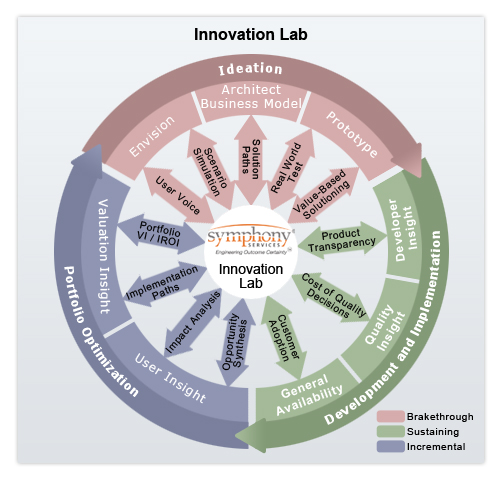How to get more
Complex business models, new technology and globalization are changing how products
are built and managed. But innovation in its many forms – usability, better integration,
SaaS, SOA, Open Source along with the next blockbuster product – still determines
the winners. With innovation, more is better. And collaboration beyond borders and
organizational walls can get you more of it – if you do it right.
If Open Innovation is more theory than practice in your R&D; organization you could
be compromising growth and competitiveness.
Open Innovation assumes organizations can and should harness external and internal
ideas along with internal and external paths to market, as a means to advance technology
and drive competitiveness. And the concept is picking up steam. A recent Economist
Intelligence Unit study found 64% of companies surveyed already collaborate with
outsourcing vendors in their R&D; processes and predicts the number will grow to
75% in the next three years.
But putting Open Innovation into practice can be challenging for R&D; organizations
that:
- View co-creation of products with external partners as daunting – requiring both
a mindset shift and support from top management
- Allow the not-invented-here syndrome to block the generation and execution of new
ideas and compromise getting to market quickly
- Fear that sharing ideas with an innovation partner will tip off competitors
- Think the complexities of a global delivery model could actually lead to a lower
innovation yield
Some of these challenges require a mindset change and others require a well-managed
process. We can help with both. In fact, Symphony's Innovation Labs were created
for just this reason.
Client Innovation Labs
Symphony's Innovation Labs are where innovation principles and practices come together
in a specialized environment to team with clients to develop and validate and commercialize
ideas for new products, features and processes.
Innovation Labs address the need to innovate across the lifecycle of products and
services. While innovation can come from any part of the lifecycle, the mission
of innovation shifts as the lifecycle evolves—breakthrough, incremental, and sustaining
innovation. So we customize our approach for each client and can execute against
one or all innovation missions – Ideation, Development and Implementation or Portfolio
Optimization.
For example, when we are executing ideation in an Innovation Lab, we build a dedicated
environment of specialized hardware and software where innovation teams apply discovery
techniques to rapidly identify solutions. Clients benefit by reducing the risk of
developing the wrong or incomplete solution and speeding time to product/feature
realization.
Effective collaboration with 'outsiders' thousands of miles away is not easy. But
it can be done and it can significantly increase the innovation yield from your
R&D; investment.
